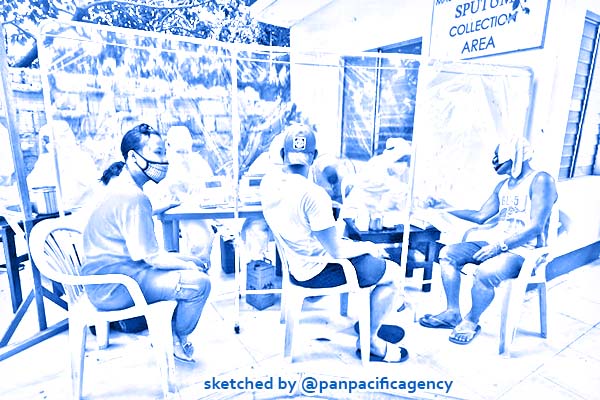Philippine govt’s goal is to test 1.5-2 per cent of population for Covid-19

Citizens undergo coronavirus testing in a quarantined community in Mandaluyong City, Metro Manila, Philippines, on May 11, 2020. PHOTO: EPA-EFE. Sketched by the Pan Pacific Agency.
MANILA, May 19, 2020, PhilStar. The Philippines is eyeing to test 1.5-2% of its almost 110 million population for the novel coronavirus, Malacañang said as it stressed that it would be “physically impossible” to test everyone in the country, a feat that those calling for mass testing are not expecting the government to do, The Philippine Star reported.
Presidential spokesperson Harry Roque said this Tuesday following criticisms that the government does not have a plan for mass testing and that it leaves such efforts to the private sector.
In an interview on CNN Philippines, Roque said that no country will test 100% of its population.
“What what we’re doing is trying to follow the best examples that we have. Right now, we’re trying to follow the footsteps of South Korea and that’s why the goal is to test 1.5 to 2 percent of the total population,” he said
The government’s target will be between 1.65 million and 2.2 million individuals who will be tested for COVID-19. According to the latest data of the Department of Health, only 207,823 people have been tested for COVID-19 in the country.
The Philippines currently has 30 licensed laboratories across the archipelago, which can process some 11,000 polymerase chain reaction-based tests per day, DOH said.
A target of 30,000 tests per day has been set for the end of May.
‘Expanded targeted testing’
Roque also said that “expanded targeted testing” is a better term to describe the government’s testing efforts, claiming that it is wrong to use the term “mass testing”—a term that he himself used in a press briefing on Monday.
“There is no perfect formula. We only need to follow the global benchmark and build capacity to test broadly and swiftly,” he said in English and Filipino.
Under the government’s testing protocol, people who experience symptoms of COVID-19, those returning from overseas, all close contacts of those persons and those whose rapid antibody test results yielded positive need to undergo PCR-based tests.
The presidential spokesperson also denied that the government is passing the responsibility of testing its citizens to the private sector.
“The government is not leaving expanded testing to the private sector. We are partners with the private sector in this,” Roque said.
In his press briefing on Monday, Roque said the government acknowledges “the initiative of the private sector in buying rapid test kits to test their employees.”
Widespread testing is crucial in the fight of virus-hit countries such as South Korea as it allows authorities to isolate and treat infected people.